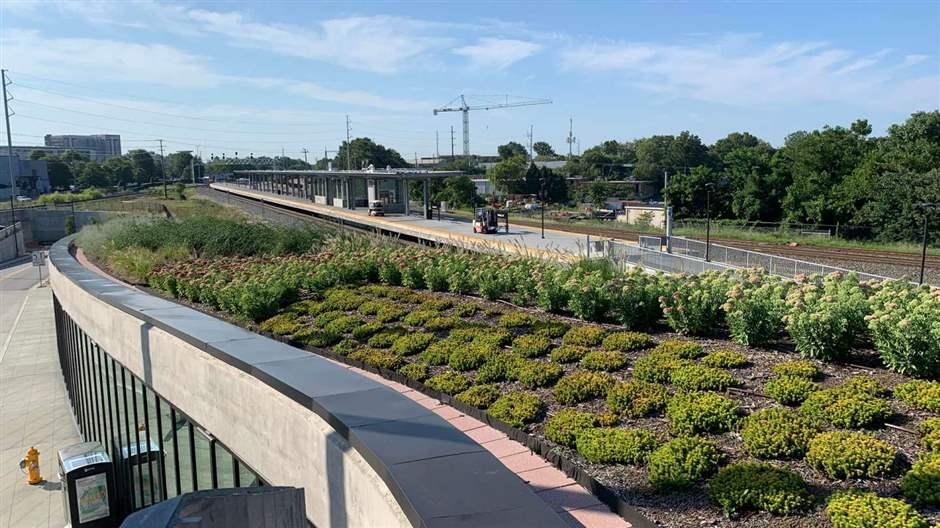To Counter Rise in Flooding From Mountains to the Coast, North Carolina Looks to Nature
State’s new budget includes historic funding for flood resilience

Across North Carolina’s varied topography, flooding is an ever-present threat. Particularly damaging hurricanes and torrential inland storms have flooded communities from the coastal east to the mountainous west in the past five years, and scientists say such events are likely to increase in frequency and intensity.
To prepare for such storms, leaders at the local and state level are looking to projects and designs that harness the ability of nature to absorb and capture stormwater, from roadside rain gardens to restored forest lands and wetlands. Cities and state agencies are prioritizing such approaches in new construction and infrastructure, while Governor Roy Cooper’s (D) recent enactment of the 2021 state budget includes funding for nature-based stormwater management and resilience planning programs.
These promising actions are backed by the state’s Climate Risk Assessment and Resilience Plan, completed in June 2020, which assesses vulnerabilities, identifies strategies to address them, and concluded that, “The time to implement nature-based solutions is now.”
In support of that plan, the North Carolina Coastal Federation (NCCF) and The Pew Charitable Trusts convened more than 60 experts across four working groups—including state agency officials, nonprofit organizations, developers, and local government representatives—through 2020 to determine how communities and the state could ramp up the use of nature-based solutions to flooding. With their input, Pew and NCCF released the “Action Plan for Nature-based Stormwater Strategies” in March 2021 to advance the use of effective natural stormwater management around homes, businesses, farms, roads, open space, and more. The action plan emphasizes the need for state and local governments to lead by example in using nature-based solutions and, since then, decision-makers across all levels of government have done so.
New state budget includes natural infrastructure investments
The North Carolina state budget, passed by the legislature with bipartisan support on Nov. 18, contains several provisions that mark a historic investment in flood-preparedness, stormwater infrastructure, and resilience. A new Stormwater Infrastructure Investment Fund received $100 million in funding, for which nature-based projects are eligible. The budget also establishes and funds a Flood Resilience Blueprint program to comprehensively model factors that contribute to flooding across neighboring communities and identify the most effective mitigation projects with the greatest environmental benefits. This is one of the priority recommendations of the Pew-NCCF action plan, because these analyses can reveal effective decentralized nature-based approaches, such as providing incentives for farming practices that retain and filter water across a region to reduce collective flood intensity downstream. The need for such a program was highlighted by NCCF Executive Director Todd Miller in his March testimony to the state Senate’s Select Committee on Storm Related River Debris and Damage in North Carolina.
Many members of the North Carolina General Assembly are enthusiastic about natural flood mitigation. “We’ve really embraced nature-based solutions,” state Senator Jim Perry (R) said in an August briefing to members of the action plan working group, “[and] the action plan has provided invaluable information.”
State Transportation Department also embraces natural solutions
The North Carolina Department of Transportation (NCDOT) has also taken up recommendations from the action plan as the agency updates policy to incorporate more nature-based solutions and work toward a more resilient transportation system. Andy McDaniel, a transportation engineer and working group member, spoke at an event hosted by NCCF-Pew about NCDOT’s efforts to increase its use of nature-based solutions through broad updates to policy and design standards, such as the agency’s Stormwater Design Manual, and outreach to local transportation planners. NCDOT is also conducting research and field testing on practices that capture and infiltrate more runoff from roadways, such as soil alternatives and native plantings along roadsides, and bioswales and stormwater wetlands across NCDOT-owned properties.
Raleigh prioritizes green stormwater infrastructure
Kevin Boyer, water quality manager with the Stormwater Management Division in Raleigh and a member of the action plan working group, helped develop the Green Stormwater Infrastructure Plan adopted by the Raleigh City Council in July 2021. The city’s plan incorporates several recommendations from the Pew-NCCF research. These include requiring low-impact development techniques in city projects, such as parks that capture stormwater, and establishing a staff position to educate the public and work with private developers to incorporate these designs.
“Our goal is to lead by example in protecting our streams and lakes, and reducing water pollution,” Boyer said. “With this plan, we are focused on developing in greener ways and creating processes that help others do the same. Working with the community on these efforts can save money, make development more resilient, and showcase better ways for protecting the environment.”
With funding from the new budget, local and state officials must continue to work with the private sector and residents to make smart investments in solutions that address risk, provide social and economic benefits, and can withstand increased extreme rainfall over time. These commitments to nature-based stormwater strategies and support for watershed-scale planning mark major progress toward a more flood-resilient North Carolina.
Yaron Miller is a senior officer and Kristiane Huber is a principal associate with The Pew Charitable Trusts’ flood-prepared communities project.







